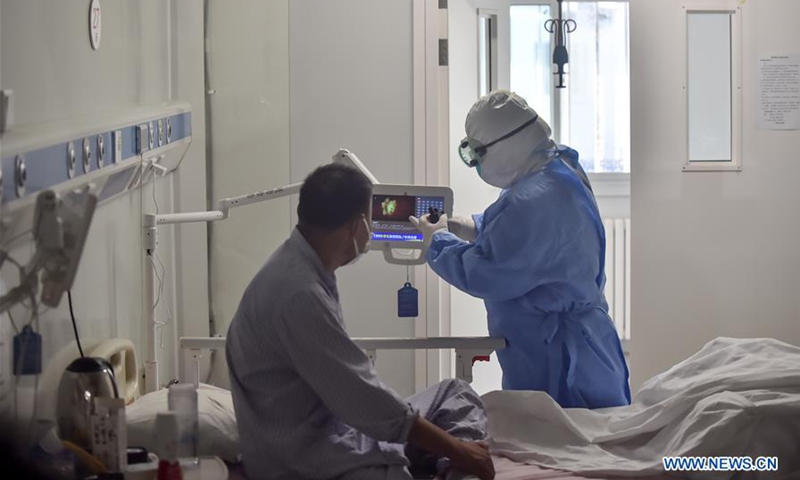Beijing's new regulations protect 'whistle-blowers' in public health emergencies
Source: Global Times Published: 2020/9/26 11:06:43

A nurse adjusts a TV set for a COVID-19 patient at an isolation ward in Beijing Ditan Hospital in Beijing, capital of China, June 16, 2020. Chinese health authority said Tuesday that it received reports of 40 new confirmed COVID-19 cases on the Chinese mainland Monday, of which 32 were domestically transmitted and eight were imported. Of the domestically transmitted cases, 27 were reported in Beijing, four in Hebei Province, and one in Sichuan Province, the National Health Commission said in its daily report. Right now, all the COVID-19 patients reported in Beijing are receiving medical treatment in Beijing Ditan Hospital. (Photo: Xinhua)
Beijing is joining other Chinese cities in providing legal protection for "whistle-blowers" in public health emergency events following the tragic death of Wuhan doctor Li Wenliang, which triggered public reflection in China on the country's health emergency warning and reporting systems.
The regulation on public health emergency response in Beijing was approved at a session of the Standing Committee of the 15th Beijing Municipal People's Congress on Friday.
According to the regulation, Beijing will establish an information reporting system for public health emergencies. Any organization or individual now has the right to report potential public health emergencies to the government and relevant departments through different channels, including the municipal government's hotline (12345) as well as hotlines of relevant departments, government websites and new media platforms.
Medical staff who find clues that may lead to a potential public health emergency will be able to report their findings to medical institutions and disease control and prevention institutions, and they may go beyond their level in case of emergency.
Those who report the clues or hidden dangers in public health emergencies — also known as "whistle-blowers" — should be protected by the relevant departments with regard to their personal information and safety. They will be rewarded for their reporting once verified and will not be investigated for legal responsibility if they do not make a malicious report, the regulation said.
Although Li Wenliang, an ophthalmologist from the Central Hospital of Wuhan, the country's region worst-hit by COVID-19, who tried to warn his friends of the novel coronavirus, was not the "whistle-blower" for the COVID-19 epidemic, Li's case has brought the spotlight on the public health emergency warning and reporting system in China. Another Wuhan doctor, Zhang Jixian, who reported cases of unknown pneumonia three days earlier than Li, was the first to report potential cases of COVID-19.
Shenzhen in South China's Guangdong Province has released a similar regulation to protect "whistle-blowers" who report potential public health emergency hazards, and the city's regulation will be implemented on October 1.
Beijing's regulation allows medical staff to report beyond their level in case of an emergency after Zhang's report timeline revealed, upon reflection by medical professionals, that the reporting procedure should be shortened.
Zhang first reported the cases to the hospital on December 27, then the hospital reported it to local centers for disease control and prevention before the reports made their way to the Wuhan city government and provincial government. At that point, different levels of government arranged inspections at hospitals.
The reporting procedure was not completed improperly in this case, according to the current system, but it wasted valuable time. Zhang Boli, a key expert-consultant in the epidemic fight in Central China's Hubei Province, said ahead of the third annual session of the 13th National People's Congress (NPC) in May that the grass-roots level governments should be authorized to report to the central government directly in the future.
The Wuhan government has also been reflecting on its initial handling of COVID-19. Zheng Yun, deputy director of the Wuhan municipal health commission, said on Friday that the city has established an epidemic prevention system after the city was lifted from lockdown on April 8, and that Wuhan will build an emergency response system and strengthen information construction, local news site cjn.cn reported on Friday.
Global Times
Posted in: SOCIETY